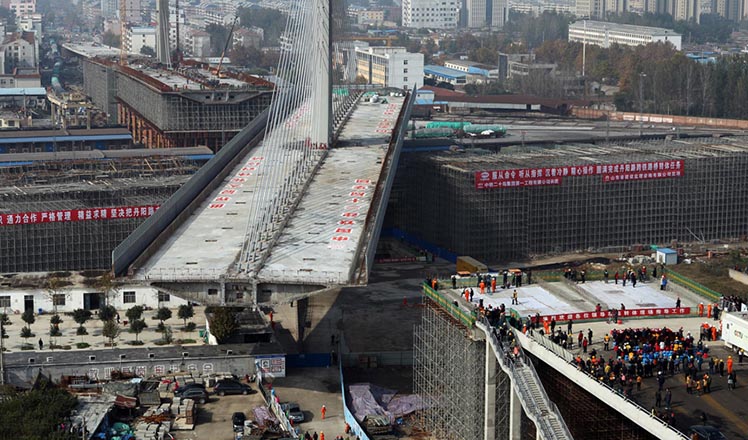UK business calls for exclusive visa system for post-Brexit London
Updated: 2016-11-11 15:53
(Xinhua)
|
||||||||
 |
|
A Union flag flies in the wind in front of the Big Ben clock face and the Elizabeth Tower at the Houses of Parliament in central London on November 3, 2016. [Photo/VCG] |
LONDON - Business leaders in London have proposed a plan for a London-only visa system for foreign workers to use after the UK's exit from the European Union (EU).
The London Chamber of Commerce and Industry (LCCI), London's largest independent networking and business support organization, called on Thursday for the city to have its own Capital Work Permits, which would be visas allowing EU nationals and other foreign workers to work in the city.
According to LCCI's proposals, the permits would be administered by the London Work Permit Sponsorship Body newly formed by the Office of Mayor and the established main London Business Organizations, and they would allow workers to work anywhere within the city's 33 boroughs.
More than 771,000 EU nationals work in London, whose status over the coming years has been unclear since the UK voted to leave the EU in the June 23 referendum.
As EU citizens, they are currently able to work throughout the UK without the need for a work visa. However, the British government has talked of restricting access for foreigners to the UK labor market once Brexit becomes reality.
The largest presence of EU nationals in the London workforce is in construction, where they make up 30 percent of the total workers, but they also have a significant presence in hospitality and distribution (20 percent) as well as in finance (14 percent).
It is estimated that 160,000 of these workers would not meet visa requirements under existing immigration rules.
This would cost the London economy seven billion pounds in lost economic output and two billion pounds in lost tax revenue up to 2020, according to the LCCI.
The call for special London visas was made in a LCCI report, which was supported by academic research from the Center for Economics and Business Research (CEBR).
The CEBR research found that London relied more on non-UK workers than any other UK region, with migrants making up a quarter of the capital's workforce. For the rest of the UK, the average was 8 percent of the workforce.
In addition, for more than two years the LCCI's quarterly economic surveys have found that London businesses have difficulty finding sufficiently skilled applicants for job vacancies.
"In the approaching post-Brexit scenario, for London to remain competitive, we need to not only recruit the very best but also to be able to identify where we have skills shortages and act swiftly to address these." LCCI chief executive Colin Stanbridge said.
"Given the role and input (of foreign workers), it is vital to London's future that a degree of flexibility is applied if the government amends the UK immigration system," he added.
- Online shopping frenzy sparks trash concern
- Is it a thing? 10 odd jobs where you can make good money
- Message on a bottle: Mineral water company launches drive to find missing children
- Snow leopards caught on camera
- A foreigner's guide to Singles Day shopping spree
- China jails 49 for catastrophic Tianjin warehouse blasts
- Americans want to change presidential election system
- UK business calls for exclusive visa system for post-Brexit London
- Australia poised to sign refugee deal with United States: media
- Philippines' Duterte says he is against 2014 defense pact with US
- S.Africa wants to work with US in promoting peace: Zuma
- Trump's victory on global pages

 Alibaba breaks sales record on Singles Day
Alibaba breaks sales record on Singles Day
 Ten photos from around China: Nov 4-10
Ten photos from around China: Nov 4-10
 Snow storm hits Xinjiang
Snow storm hits Xinjiang
 Clinton concedes election, urges open mind on Trump
Clinton concedes election, urges open mind on Trump
 Places to enjoy golden gingko tree leaves
Places to enjoy golden gingko tree leaves
 Taobao village gets ready for shopping spree on 11/11
Taobao village gets ready for shopping spree on 11/11
 Overhead bridge rotated in East China's Shandong
Overhead bridge rotated in East China's Shandong
 The 75th anniversary of Red Square parade celebrated
The 75th anniversary of Red Square parade celebrated
Most Viewed
Editor's Picks

|

|

|

|

|

|
Today's Top News
No environmental shortcuts
US election rhetoric unlikely to foreshadow future US-China relations
'Zero Hunger Run' held in Rome
Trump outlines anti-terror plan, proposing extreme vetting for immigrants
Phelps puts spotlight on cupping
US launches airstrikes against IS targets in Libya's Sirte
Ministry slams US-Korean THAAD deployment
Two police officers shot at protest in Dallas
US Weekly

|

|







